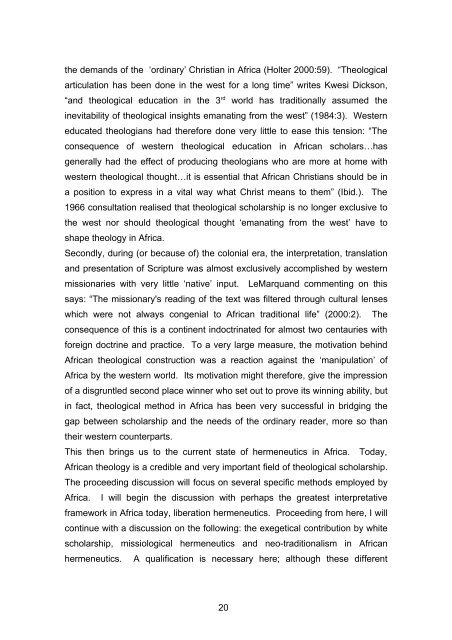African Hermeneutics: The Current State - Theology In Africa
African Hermeneutics: The Current State - Theology In Africa
African Hermeneutics: The Current State - Theology In Africa
You also want an ePaper? Increase the reach of your titles
YUMPU automatically turns print PDFs into web optimized ePapers that Google loves.
the demands of the ‘ordinary’ Christian in <strong>Africa</strong> (Holter 2000:59). “<strong>The</strong>ological<br />
articulation has been done in the west for a long time” writes Kwesi Dickson,<br />
“and theological education in the 3 rd world has traditionally assumed the<br />
inevitability of theological insights emanating from the west” (1984:3). Western<br />
educated theologians had therefore done very little to ease this tension: “<strong>The</strong><br />
consequence of western theological education in <strong><strong>Africa</strong>n</strong> scholars…has<br />
generally had the effect of producing theologians who are more at home with<br />
western theological thought…it is essential that <strong><strong>Africa</strong>n</strong> Christians should be in<br />
a position to express in a vital way what Christ means to them” (Ibid.). <strong>The</strong><br />
1966 consultation realised that theological scholarship is no longer exclusive to<br />
the west nor should theological thought ‘emanating from the west’ have to<br />
shape theology in <strong>Africa</strong>.<br />
Secondly, during (or because of) the colonial era, the interpretation, translation<br />
and presentation of Scripture was almost exclusively accomplished by western<br />
missionaries with very little ‘native’ input. LeMarquand commenting on this<br />
says: “<strong>The</strong> missionary's reading of the text was filtered through cultural lenses<br />
which were not always congenial to <strong><strong>Africa</strong>n</strong> traditional life” (2000:2). <strong>The</strong><br />
consequence of this is a continent indoctrinated for almost two centauries with<br />
foreign doctrine and practice. To a very large measure, the motivation behind<br />
<strong><strong>Africa</strong>n</strong> theological construction was a reaction against the ‘manipulation’ of<br />
<strong>Africa</strong> by the western world. Its motivation might therefore, give the impression<br />
of a disgruntled second place winner who set out to prove its winning ability, but<br />
in fact, theological method in <strong>Africa</strong> has been very successful in bridging the<br />
gap between scholarship and the needs of the ordinary reader, more so than<br />
their western counterparts.<br />
This then brings us to the current state of hermeneutics in <strong>Africa</strong>. Today,<br />
<strong><strong>Africa</strong>n</strong> theology is a credible and very important field of theological scholarship.<br />
<strong>The</strong> proceeding discussion will focus on several specific methods employed by<br />
<strong>Africa</strong>. I will begin the discussion with perhaps the greatest interpretative<br />
framework in <strong>Africa</strong> today, liberation hermeneutics. Proceeding from here, I will<br />
continue with a discussion on the following: the exegetical contribution by white<br />
scholarship, missiological hermeneutics and neo-traditionalism in <strong><strong>Africa</strong>n</strong><br />
hermeneutics. A qualification is necessary here; although these different<br />
20


